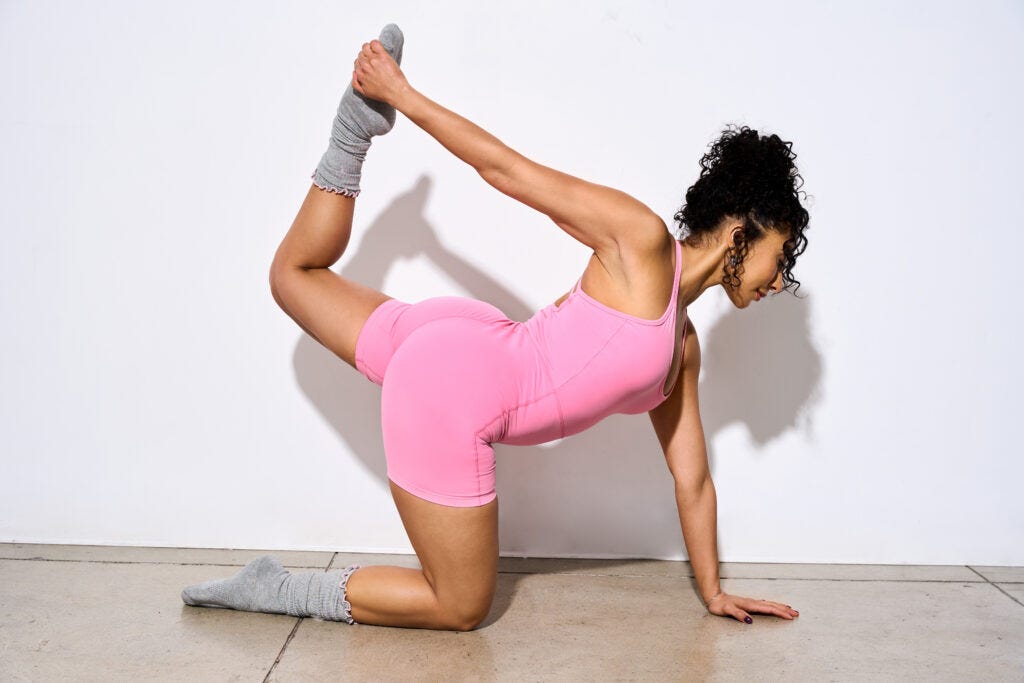Harsh Reality: Pilates Body Raven's Comments Spark Backlash
Raven compares Pilates to a luxury like Bottega
Is Pilates a tool for health, or a luxury like Bottega?
Raven Ross, better known as Pilates Body Raven, gave us her answer and it sparked chaos on TikTok.
For anyone new here, Harsh Reality is my segment where I unpack reality TV with no filters, no favorites, and no illusions. This is an interesting Harsh Reality post, as it’s not about reality TV per se.
This is all about Pilates.
However, to provide proper context, I must take you back to the reality TV streets.
Raven Ross first gained notoriety on Season 3 of Love Is Blind: Dallas. Which, my dedicated LIB fans will remember, was a notably chaotic season. Raven was at the center of that storm in some ways. She was matched with SK, who said no to her at the altar. Still, they continued dating long-distance after the show, until multiple infidelity allegations surfaced, ultimately ending their relationship.
After that, she largely disappeared from the spotlight. One of the few exceptions was an interview with Lovers by Shan called “Can a Man Love You More Than You Like Yourself?” In that episode, Raven suggested her new partner at the time had asked her to step back from the limelight. Her comments about that relationship briefly trended after the interview's release, with many pointing out the glaring red flags in her story of their romance that she seemed oblivious to. Rumor has it that the relationship has since ended.
Since then, she’s shifted her focus. Raven has built out her Pilates brand, offering free at-home content, YouTube videos, pop-ups, and in-person classes. She’s serious, she’s skilled, and for many, this is how they know her now—less for the reality TV drama, more for the quality fitness instruction.
Recently, Raven has re-entered the public eye. She’s currently trending because of a video in which she shared a hot take arguing that Pilates should be viewed like a luxury good, similar to Bottega. In her framing, with a luxury brand, you don’t ask about accessibility or diversity; you accept it for what it is. An inherently exclusive product that not everyone could or should be able to afford.
The video sparked immediate backlash, especially on TikTok. People started sharing receipts about their experiences trying to collaborate with her for community fitness events, only to be quoted fees in the range of $3,500 for a single class. Strange, considering Raven positions her brand as one that champions accessibility for women.
Even her follow-up apology video repeated that claim. However, the apology itself came across as flippant, if not outright insincere.
The whole thing reads like self-sabotage. Yes, we know wellness industries come with systemic inequities, but legitimizing exclusivity as a virtue? That’s a bad take.
Then there’s her actual logic, which doesn’t hold. She said luxury brands are trusted because of their inherent quality. But in reality, many luxury goods are produced in the same factories as cheaper alternatives. What you’re paying for is the label and the markup, not always a meaningful difference in quality.
The comparison exposes more than she might have intended: it makes her own practices look like inflated branding wrapped around something that should be accessible by design.
None of this would have even been worth dissecting if Raven hadn’t blown up her own spot.
Pilates wasn’t born in boutique studios. Joseph Pilates developed it while interned as a German prisoner of war during World War I. With scarce resources, he devised ways to keep his body strong and resilient under the harshest conditions. After the war, he refined his method and eventually opened a studio in New York with his wife. The practice spread, shaped in part by dancers and, more significantly, by instructors like Kathy Stanford Grant — a Black woman and one of the few certified directly by Pilates himself — who helped bring it to a broader audience. In other words, the foundation of Pilates is survival, creativity, and resilience under constraint. Not elitism.
Certainly not luxury.
The comparison exposes more than she might have intended: it makes her own practices look like inflated branding wrapped around something that should be accessible by design.
So, I start this Harsh Reality post by bringing up pieces of Raven’s past. Not because her relationship choices are directly relevant to Pilates, but because they offer us a glimpse into how she rationalizes decisions — and what we might expect from her public persona.
Honestly, her best move was focusing on the workouts.
Her workouts? Excellent.
Her ideas? Questionable.
The bigger takeaway is what this controversy exposes about Pilates and wellness culture as a whole: Elitism, classism, racism, anti-Blackness, anti-fatness, and the way those things structure our relationship with our bodies and with our health. Other creators have pointed out how studio culture and location contribute to the problem, as well as the prohibitively expensive cost of becoming a certified Pilates instructor. These structural factors, among many others, matter.
Fitness, at its best, is a popular form of preventive healthcare. Great instructors are at the forefront of that work. In that sense, Raven’s comments weren’t just a PR slip. They were irresponsible. And they point not only to her misjudgment, but also possibly to the limited frameworks she’s been given to understand and present her own craft.
Further Reading
Killer Instinct is a cultural dispatch on Black diasporic life and sharp media critique. I host a live Internet radio show called Killer Frequency every Friday at 1pm AST—join me. Support, subscribe, and stay sharp 🗡.



